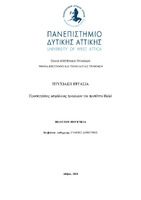| dc.contributor.advisor | Τυμπής, Δημήτριος | |
| dc.contributor.author | Πολύζου, Ιφιγένεια | |
| dc.date.accessioned | 2021-07-15T08:21:54Z | |
| dc.date.available | 2021-07-15T08:21:54Z | |
| dc.date.issued | 2021-07-08 | |
| dc.identifier.uri | https://polynoe.lib.uniwa.gr/xmlui/handle/11400/784 | |
| dc.identifier.uri | http://dx.doi.org/10.26265/polynoe-635 | |
| dc.description.abstract | Το φαγητό, εκτός από τον προφανή λειτουργικό του ρόλο που είναι η θρέψη του οργανισμού, φέρει και ένα πλούσιο πολιτιστικό φορτίο. Τα τρόφιμα που καταναλώνονται, η διαδικασία με την οποία παράγονται και επεξεργάζονται , τα άτομα που τα προετοιμάζουν καθώς και το ποιος ενδεχομένως καταναλώνει πρώτος τελικά τα προϊόντα αυτά στο τραπέζι, αποτελεί μια μορφή επικοινωνίας που μπορεί να ενισχύσει τους δεσμούς μεταξύ ατόμων και κοινοτήτων. Ειδικότερα, για ομάδες θρησκευόμενων ανθρώπων το φαγητό αποτελεί αναπόσπαστο κομμάτι λατρευτικών πρακτικών. Ορισμένες θρησκείες, συνδέουν την διατροφή με την έννοια της υπακοής στον Θεό, μέσω ιερών εντολών που περιλαμβάνουν στα δόγματα τους. Συνεπώς, όμοια προϊόντα διατροφής είναι δυνατόν να παρασκευάζονται με διαφορετικές μεθόδους, ανάλογα με την κουλτούρα του κοινού για το οποίο προορίζονται.
Με αφορμή τον έντονο ρυθμό ανάπτυξης των μουσουλμανικών πληθυσμών τα τελευταία χρόνια, γίνονται πολλές συζητήσεις γύρω από τα ειδικά προϊόντα διατροφής μουσουλμάνων, γνωστά και ως τρόφιμα Halal.
Η παρούσα πτυχιακή εργασία έχει ως στόχο την εξειδικευμένη προσέγγιση και ανάλυση των κρίσιμων σταδίων παραγωγής και διάθεσης Halal προϊόντων διατροφής. Σε πρώτη φάση γίνεται ανασκόπηση των ιερών νόμων που διέπουν το Ισλάμ εστιάζοντας κυρίως στους διατροφικούς περιορισμούς που προκύπτουν από το Κοράνι. Σε δεύτερη φάση γίνεται περιγραφή των κυριότερων ομάδων τροφίμων και παρατίθενται οι σημαντικότερες απαιτήσεις παραγωγής ώστε οι ομάδες αυτές να ανταποκρίνονται στα Ισλαμικά πρότυπα διατροφής. Επίσης, καθορίζονται ως επιτρεπτά ή μη για χρήση σε Halal τρόφιμα, διάφορα πρόσθετα τροφίμων, όπως οι ζελατίνες ή τα ένζυμα. Ιδιαίτερα τονίζονται επίσης, οι αυστηρές απαιτήσεις που σχετίζονται με τη σφαγή και μεταχείριση των ζώων, οι οποίες θα πρέπει να τηρούνται πιστά, ώστε να προκύψουν Halal τρόφιμα. Τέλος, γίνεται αναφορά σε ζητήματα συσκευασίας και ετικετοποίησης των Halal προϊόντων και περιγράφεται η διαδικασία πιστοποίησης Halal των τροφίμων σύμφωνα με το υπάρχον σύστημα στην Ελλάδα καθώς και πως αυτή κατοχυρώνεται σε διεθνές επίπεδο. | el |
| dc.format.extent | 93 | el |
| dc.language.iso | el | el |
| dc.publisher | Πανεπιστήμιο Δυτικής Αττικής | el |
| dc.rights | Αναφορά Δημιουργού - Μη Εμπορική Χρήση - Παρόμοια Διανομή 4.0 Διεθνές | * |
| dc.rights | Attribution-NonCommercial-NoDerivatives 4.0 Διεθνές | * |
| dc.rights | Attribution-NonCommercial-NoDerivatives 4.0 Διεθνές | * |
| dc.rights.uri | http://creativecommons.org/licenses/by-nc-nd/4.0/ | * |
| dc.subject | Ισλάμ, Τρόφιμα Halal, Πιστοποίηση Halal, Βιομηχανία Halal | el |
| dc.title | Προσεγγίσεις ασφάλειας τροφίμων για προϊόντα Halal | el |
| dc.title.alternative | Food safety approaches for Halal products | el |
| dc.type | Πτυχιακή εργασία | el |
| dc.contributor.committee | Τσάκαλη, Ευσταθία | |
| dc.contributor.committee | Κουλούρης, Σπυρίδων | |
| dc.contributor.faculty | Σχολή Επιστημών Τροφίμων | el |
| dc.contributor.department | Τμήμα Επιστήμης και Τεχνολογίας Τροφίμων | el |
| dc.description.abstracttranslated | Food, in addition to its obvious functional role which is the nutrition of the body,has a rich cultural burden. The food that is consumed, the process that is produced and processed, the people who prepare them until their final consumption, who sits and who may be the first to consume these products at the table, is a form of communication that can inspire and strengthen ties between individuals, communities and even countries.
For example, for groups of religious people, food is an integral part of their worship practices. Some religions, in fact, associate nutrition with the concept of obedience to God, through various sacred commandments contained in their doctrines. Therefore, similar food products can be prepared in different ways depending on the culture of the public for which they are intended.
Due to the rapid growth of the Muslim population in recent years in Europe and America there is a lot of talk about special Muslim food products, also known as Halal food. The present dissertation aims at the specialized approach and analysis of the critical stages of production and distribution of Halal food products. In the first phase, is given a review of the holy laws that govern Islam, focusing mainly on the dietary restrictions arising from the Qur'an and how they correspond to the different categories of food. In the second phase are listed the main food groups such as meat, fish, dairy and the most important production requirements so that these groups meet the Islamic dietary standards. Also, they are defined as permissible or not for use in Halal foods, various food additives such as gelatins or enzymes. Particular reference is also made to the strict guidelines related to the slaughter and treatment of animals, which must be adhered to in order to produce Halal food. Finally, reference is made to issues of packaging and labeling of Halal products and is described the process of Halal certification of food according to the existing system in Greece and how it is ensured internationally. | el |


